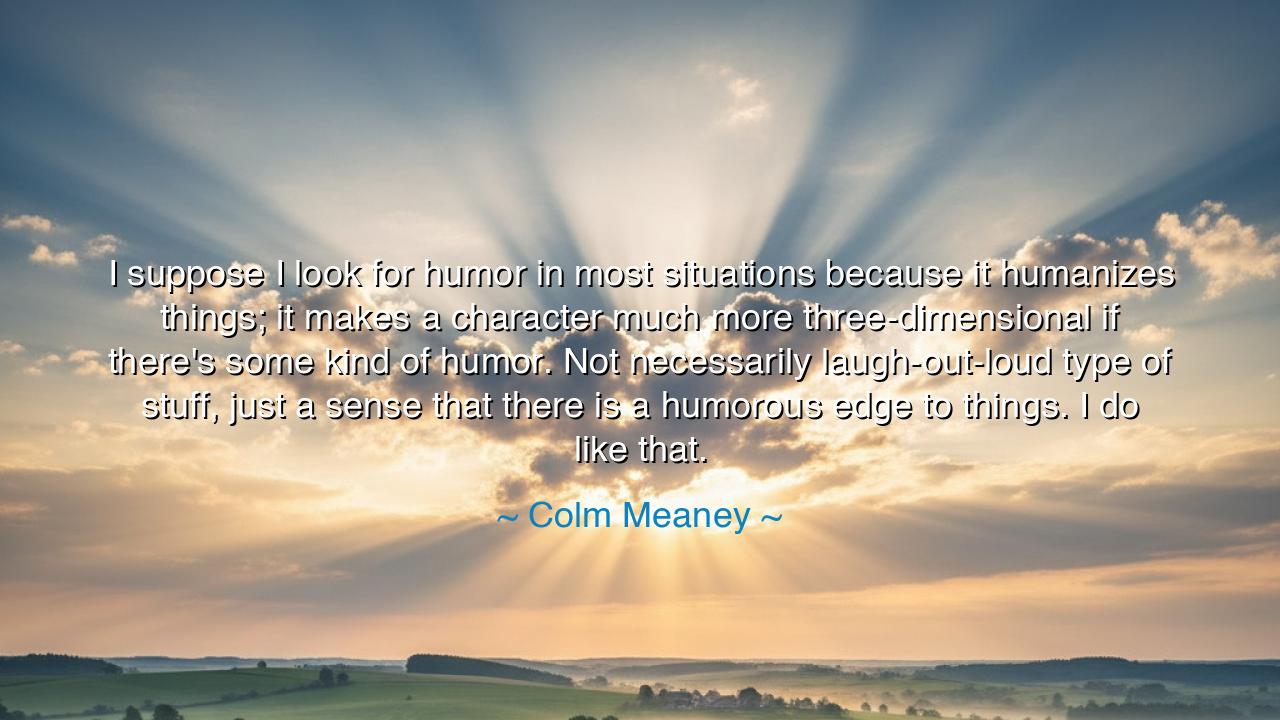
I suppose I look for humor in most situations because it
I suppose I look for humor in most situations because it humanizes things; it makes a character much more three-dimensional if there's some kind of humor. Not necessarily laugh-out-loud type of stuff, just a sense that there is a humorous edge to things. I do like that.






The words of Colm Meaney, “I suppose I look for humor in most situations because it humanizes things; it makes a character much more three-dimensional if there's some kind of humor. Not necessarily laugh-out-loud type of stuff, just a sense that there is a humorous edge to things. I do like that,” carry within them the warmth of human understanding. They are not the words of one who merely acts, but of one who sees — who understands that beneath all sorrow and triumph, all glory and failure, there lies the shared heartbeat of humanity. Through humor, he speaks of something far greater than amusement; he speaks of the bridge that connects souls, the spark that keeps us tender even when the world hardens around us.
In the ancient world, the playwrights of Greece understood this truth deeply. Sophocles and Euripides wrote of kings and gods, of war and tragedy — yet even amidst their sorrowful tales, they allowed space for moments of levity. For they knew that laughter is not the opposite of suffering, but its companion; it reminds us that life, even in its darkest hour, retains a glimmer of grace. Humor humanizes — it draws us back from the edge of despair and reminds us that the divine spark within us still flickers. When Meaney speaks of giving his characters a “humorous edge,” he echoes the voice of those ancient storytellers who understood that the truest reflection of humanity lies not in perfection, but in contradiction: in the tears that accompany laughter, and the laughter that follows tears.
For what is humor, if not the wisdom of the heart made light? It is the ability to see truth without bitterness, to recognize folly without cruelty. The one who can smile at life’s absurdities stands above them, not with pride, but with compassion. Consider the philosopher Diogenes, who lived in a barrel and mocked the arrogance of the powerful by humor alone. When Alexander the Great, conqueror of the world, came to visit him and asked if there was anything he could do for him, Diogenes replied, “Yes — stand out of my sunlight.” The people laughed, but in that laughter was enlightenment: the humbling of greatness before simplicity. Diogenes’ wit was not cruelty, but clarity. Through humor, he made even emperors human.
In Meaney’s craft — the art of acting — this principle becomes sacred. To portray a character without humor is to sculpt a statue without warmth. A man who cannot laugh becomes a symbol, not a soul. But to grant him humor, even a quiet, subtle kind, is to breathe into him the spirit of life. A villain who jokes becomes complex; a hero who stumbles becomes beloved. The ancients would call this the “pathos of the human heart” — that invisible thread of emotion that binds all people through shared imperfection. Humor, in its gentlest form, is the key that unlocks empathy.
There is also great wisdom in Meaney’s distinction — that humor need not be loud to be true. The subtle humor, the small smile amidst grief or the weary joke in hardship, carries a deeper power than roaring laughter. It is the humor of endurance, the quiet rebellion of the soul that refuses to be crushed. When soldiers on ancient battlefields shared jokes before the dawn, when prisoners whispered laughter through the bars, when the downtrodden sang songs of mockery against their oppressors — they were not laughing because life was kind, but because they chose to remain human in the face of cruelty. Such humor is sacred defiance, the light that darkness cannot swallow.
Let us recall the story of Abraham Lincoln, a man burdened by the weight of a nation’s sorrow. It is said that even in the midst of the Civil War, when despair shadowed his every waking hour, he would begin cabinet meetings with a humorous story. His advisors often frowned upon it, thinking it trivial in grave times. But Lincoln knew what they did not: that humor was not escape — it was strength. It allowed him to see clearly, to lead gently, and to remember that beyond politics and death, there still existed life. His humor did not mock the suffering of others; it honored it, by keeping the heart open when the mind would close.
So let this be the teaching for those who seek wisdom in the storms of life: do not fear humor. Do not mistake it for foolishness or weakness. Let it soften your pride, broaden your vision, and remind you of the shared humanity that dwells within all. When your ego is bruised, let laughter heal it; when you meet others in their pain, let gentle humor bridge the silence. To laugh kindly is to love bravely. To smile amidst struggle is to remember that life, though fleeting, is still luminous.
And thus, as Colm Meaney so simply yet profoundly teaches, humor humanizes. It makes characters real, conversations tender, and existence bearable. Seek it not in mockery, but in understanding; not in loudness, but in light. For when we find that faint “humorous edge to things,” we rediscover the sacred truth the ancients always knew: that laughter is the language of the soul — and in that laughter, the gods themselves draw near.






AAdministratorAdministrator
Welcome, honored guests. Please leave a comment, we will respond soon